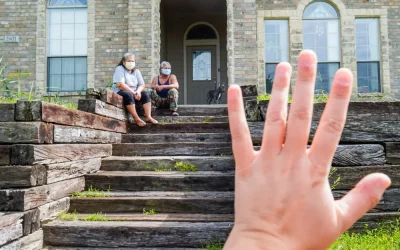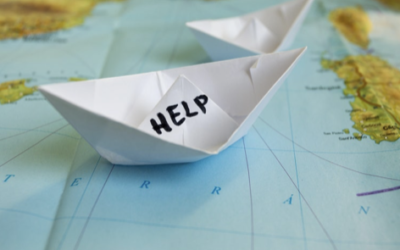Blog
News & Upates
Piecing Together the Genetic Puzzle of Schizophrenia
Genetics does play a substantial role in the origins of schizophrenia, a role that is both pretty straightforward and incredibly complicated. The straightforward part: genetic differences account for a significant portion of our risk of having a mental illness. The complicated part: determining how these genetic differences contribute to risk is anything but straightforward. Read […]
COVID-19 & Mental Health: Defend your well-being during the COVID-19 pandemic by getting – and giving – help
During these trying times, two factors are essential to maintaining a man’s mental well-being: getting and giving help. Both are challenges. Despite the benefits of getting and giving support on their physical and mental health, men are hamstrung by outdated stereotypes and social hesitancies. When ignored, conditions like depression can have devastating consequences. Alternatively, the […]
What is bipolar disorder? Expert explains misunderstood condition, symptoms
DAfter a controversial speech and a series of social media messages, many are worried about the mental health of rapper Kanye West, who has spoken in the past about being diagnosed with bipolar disorder. Other celebrities, including Mariah Carey, Bebe Rexha and Carrie Fisher, have been open about their diagnoses with the condition. Bipolar disorder […]
‘You are not alone’: The pandemic is causing increased anxiety. Here’s how to get help
A secondary health challenge is sweeping the country due to a domino effect from the coronavirus pandemic, anti-racism protests and a recession: increased bouts of depression and anxiety. A secondary health challenge is sweeping the country due to a domino effect from the coronavirus pandemic, anti-racism protests and a recession: increased bouts of depression and anxiety.The nation's future is a significant source of that stress for more than 80% of the country's adults, according to a report released Thursday from the American Psychological Association.
COVID-19 & Mental Health: 13 potential long-term effects the coronavirus pandemic could have on mental health
As the coronavirus pandemic drags on, many citizens have dealt with their lives turning upside-down. Healthcare professionals have worked long hours in tense conditions, putting themselves at risk of contracting the virus. Some families have lost multiple loved ones due to the disease, and others have lost their jobs. Business Insider spoke with psychiatrists and researchers on how they think the pandemic and its different impacts might affect people's mental health in the future.Here are some potential long-term effects of the coronavirus pandemic, according to experts.
May Is Mental Health Month: What you should know
Since 1949, Mental Health America and our affiliates across the country have led the observance of May is Mental Health Month by reaching millions of people through the media, local events and screenings. We welcome other organizations to join us in spreading the word that mental health is something everyone should care about by using the May is Mental Health Month toolkit materials and conducting awareness activities. While 1 in 5 people will experience a mental illness during their lifetime, everyone faces challenges in life that can impact their mental health.In 2020, our theme of Tools 2 Thrive will provide practical tools that everyone can use to improve their mental health and increase resiliency regardless of the situations they are dealing with. We now believe that these tools – even those that may need to be adapted for the short term because of COVID-19 and social distancing – will be more useful than ever.
COVID-19 In The Workplace: I’m a psychologist. Here’s how employers can help workers get through this pandemic
With COVID-19 dominating much of our lives, realities such as social isolation, economic losses, additional responsibilities at home, and increasingly heartrending headlines are all taking their toll on our mental health. As much of the world adopts social distancing to do their part to flatten the COVID-19 curve, many are experiencing increased feelings of stress, anxiety, sadness, or loneliness. Although about one-half of Americans report that their mental health has suffered due to the current pandemic, many are struggling to find the time and energy to prioritize mental health. At first glance, this may seem surprising. Given stressors of the pandemic, wouldn’t it make sense for people to prioritize getting mental health support?The reality, however, is that people are juggling a number of added pressures—simultaneously caring for kids while working full time, struggling to procure groceries and basic supplies, and supporting aging loved ones—all without leaving home unless...
COVID-19: How to maintain physical and mental health during coronavirus
Millions are asking for clear, comprehensive information and guidelines regarding the novel coronavirus. Unfortunately, the U.S. public hasn’t received factual information or future direction from the federal government. Instead, the government has underreported cases and local transmission rates due to a lack of testing kits. But during a crisis, leadership can come from unexpected places. As he suspended all NBA games, commissioner Adam Silver delivered a powerful message to the public that the outbreak must be taken seriously. With that single announcement, Silver enforced more effective public health policy than the White House has during this pandemic. Shortly thereafter, all other major sports leagues followed his lead; the NBA’s decisive action helped the dominoes fall.Last January, NFL running back Marshawn Lynch delivered solid advice for his younger colleagues in a post-game interview: take care of your bodies, your mentals, and your chicken (that is, your money)....
Diet and Mental Health: The Evidence To Date
Although diet can influence mental health and cognitive function, evidence of benefit for many specific diets is actually quite weak, a new review suggests. In the "most up-to-date overview of the new field of nutritional psychiatry," investigators with the Nutrition Network of the European College of Neuropsychopharmacology (ECNP) found strong evidence that following a ketogenic diet of high fat and low carbohydrates may reduce seizures in children with epilepsy. They also confirmed that the Mediterranean diet guards against depression and anxiety.In addition, there is a strong link between vitamin B12 deficiency and an increased risk of fatigue, depression, and memory problems.However, evidence of any efficacy of vitamin D supplements or any nutrient in mitigating symptoms of autism or attention deficit hyperactivity disorder (ADHD) is "inconclusive," the researchers note.
Technology: Overall time on social media is not related to teen anxiety and depression
The amount of time teenagers spend on social networking sites has risen 62.5 percent since 2012 and continues to grow. Just last year, the average time teenagers spent on social media was estimated as 2.6 hours per day. Critics have claimed that more screen time is increasing depression and anxiety in teenagers.However, new research led by Sarah Coyne, a professor of family life at Brigham Young University, found that the amount of time spent on social media is not directly increasing anxiety or depression in teenagers."We spent eight years trying to really understand the relationship between time spent on social media and depression for developing teenagers," Coyne said about her study published in Computers in Human Behavior.
Workplace: Mental Health in the Office: Difficult Conversations
How should you approach difficult conversations about mental health with your colleagues and boss? In this episode, host Morra Aarons-Mele speaks with Amy Gallo, author of “HBR Guide to Dealing with Conflict,” about when and how to disclose a mental health issue to your company. Plus, Dr. Rebecca Harley, a psychologist at Massachusetts General Hospital and Harvard Medical School, discusses the connection between mental health and recognizing boundaries at work. Learn more by listening to the podcast. HBR Presents is a network of podcasts curated by HBR editors, bringing you the best business ideas from the leading minds in management. The views and opinions expressed are solely those of the authors and do not necessarily reflect the official policy or position of Harvard Business Review or its affiliates.
Tech: Which comes first: Smartphone dependency or depression?
Young people who are hooked on their smartphones may be at an increased risk for depression and loneliness, according to a new study from the University of Arizona. A growing body of research has identified a link between smartphone dependency and symptoms of depression and loneliness. However, it's been unclear whether reliance on smartphones precedes those symptoms, or whether the reverse is true: that depressed or lonely people are more likely to become dependent on their phones. In a study of 346 older adolescents, ages 18-20, researcher Matthew Lapierre and his collaborators found that smartphone dependency predicts higher reports of depressive symptoms and loneliness, rather than the other way around."The main takeaway is that smartphone dependency directly predicts later depressive symptoms," said Lapierre, an assistant professor in the Department of Communication in the College of Social and Behavioral Sciences. "There's an issue where people are entirely too reliant on the...
Travel: 9 Super-Helpful Ways to Take Care of Your Mental Health While Traveling
When Meredith R., 28, prepared to go on her meticulously planned vacation to Paris, she wasn’t thinking too much about her mental health. In fact, she kind of hoped her depression and anxiety would take a vacation of their own while she was living out a lifelong dream. How could I be anything but happy in Paris? she thought. “I didn’t realize it until after the fact, but as I was planning, I was working around a very specific fantasy of what my vacation would look like,” she tells SELF. “That fantasy didn’t involve me being depressed or anxious.” But Meredith’s mental illnesses didn’t take a break just so she could enjoy her vacation. She had her first panic attack after navigating crowds to climb the stairs to a lookout point at Sacré-Cœur. “I was so thrown for the rest of the trip,” she says. “I was even more anxious because I thought another panic attack could strike at any time, and I got caught in a hell of a negative thought spiral about how my trip was ruined, which was...
Nutrition: What Is The Best Diet For Mental Health?
Should you eat an apple—or a bag of Oreos? Go to McDonald’s—or the vegetarian restaurant on the corner? When we make these everyday food choices, many of us think first of our physical health and appearance. But there’s another factor we may want to consider in picking foods: their impact on our mental health. A growing body of research is discovering that food doesn’t just affect our waistline but also our moods, emotions, and even longer-term conditions like depression. Which makes sense, after all. Our brains are physical entities, running on the energy that we put into our bodies, affected by shifts in our hormones, blood sugar levels, and many other biological processes.Although there are many unanswered questions, the research to date can give us some guidance when we’re hunting for an afternoon snack.
Education: College can be hard on your mental health. Here are 7 ways to cope.
In our Back to School series, Mashable tackles the big issues students face, from mental health to representation to respectful communication. Because returning to the classroom is about more than buying school supplies. People may joke about the carefree lives of college students, but the unique stress of succeeding in higher education is real. Between managing course work, finding a circle of supportive friends, figuring out your identity as a young adult, and paying for the privilege of a diploma, college can be the equivalent of a pressure cooker. Indeed, research shows that a growing number of college students say they've experienced a mental health condition, including panic attacks and anxiety.
Health: The Words My Doctor Said That Changed How I Saw Mental Health Recovery
When I first reached out for help with my mental health, I had a “quickly and quietly get help and get better” mentality. I expected the medication to start working in a few weeks and I agreed to visit my college’s counseling center. In therapy, I expected to learn some helpful tricks to help with my anxiety and depression. I thought I would struggle for a while and “get better.” I anticipated that it would be like any struggle I had in life. I was extremely misled in my expectations and mentality. My quick “fix” turned out to be the opposite. My body rejected medication after medication.
National Minority Mental Health Awareness Month: How To Keep People Engaged In Mental Health Treatment
Mental illness affects every age group, gender, socio-economic status and culture, yet not all Americans have the same access to proper care. For example, only 20% of Asian Americans with mental illness receive treatment compared to 48% of white adults. And only 56% of African Americans and Latinx adults with serious mental illness receive treatment compared to 71% of white adults. That’s why National Minority Mental Health Awareness Month was established in 2008: to help increase awareness of the barriers to mental health care for minority populations. The issue is not only the ability to access care but also the ability to obtain effective care. Far too often, people don’t remain in treatment once they begin.
Mental Health Recovery: How much does poor body image affect mental health?
Like it or not, most of us are aware of how we look. We have all had a bad hair day, or worried whether we are wearing the right clothes for a particular event. The traditional stereotype is that young women are more concerned about their appearance than young men. Societal pressures, media images, and doting relatives saying how pretty a female child looks all have an impact. But how serious an impact can it have on our wellbeing and our mental health? And just how much does our body image trouble us as we get older? Statistics by the charity the Mental Health Foundation (MHF), show that poor body self-image can affect all ages, not just younger people, and the reactions it can trigger range from anxiety and self-disgust to suicidal thoughts.
Mental Health Month: May Is Mental Health Month! #4Mind4Body
This year marks MHA's 70th year celebrating Mental Health Month!Since 1949, Mental Health America and our affiliates across the country have led the observance of May is Mental Health Month by reaching millions of people through the media, local events and screenings. We welcome other organizations to join us in spreading the word that mental health is something everyone should care about by using the May is Mental Health Month toolkit materials and conducting awareness activities.
Health: This is how sleep loss alters emotional perception
What does sleep deprivation do to the way in which we perceive various emotional stimuli? A researcher from the Karolinska Institutet in Sweden has written a thesis aiming to answer this question. Ever felt grumpy after a sleepless night? When we do not manage to satisfy our need for rest, our brains tend to rebel in various ways. Sleep deprivation, studies have shown, can be just as bad as being drunk, as it alters your perception of space and your reaction time.
Local News: Miss Louisiana United States Lauren “Tula” Poindexter using platform for Mental Health Awareness
Miss Louisiana United States 2018 Lauren ‘Tula’ Poindexter stopped by the Passe Partout studio this morning to talk about her reign and how she’s using her new platform to shine a spotlight on Mental Health awareness. And, of course, with it being Mardi Gras, she’s also spending some time celebrating. For more on her work, follow her on Instagram, Twitter, and Facebook @TulaOnTv or email her at info@tulatalks.com.
In The Workplace: 5 Ways Bosses Can Reduce the Stigma of Mental Health at Work
Experts tell us that one in four adults will struggle with a mental health issue during his or her lifetime. At work, those suffering — from clinical conditions or more minor ones — often hide it for fear that they may face discrimination from peers or even bosses. These stigmas can and must be overcome. But it takes more than policies set at the top. It also requires empathetic action from managers on the ground. We count ourselves among those who have wrestled with mental health challenges. One morning a few years ago, in the midst of a successful year, Jen couldn’t get out of bed. As a driven professional, she had ignored all the warning signs that she was experiencing Post Traumatic Stress Disorder (PTSD). But her mentor, Diana, could see something was wrong, and when Jen couldn’t come to work, the gravity of the situation became even clearer. In the ensuing weeks, we worked together to get Jen the help she needed.
New Year, Better You: How To Keep People Engaged In Mental Health Treatment
MAs we officially bid adieu to 2018 and ring in 2019, you might be thinking about ways to improve your health in the new year. If fitness goals are on your radar that’s great, but caring for your mental health is also important. The intersection between physical and mental health can be significant, and stress can compromise both of these if you’re not taking regular steps to manage its effects. These mental health boosts to try in 2019 are simpler (and more effective) than they might seem. "The symptoms associated with stress can affect your body, your thoughts and feelings, and your behavior," Lisa Brateman, LCSW, an NYC-based psychotherapist and relationship specialist tells Bustle via email. "Prolonged stress can contribute to feeling overwhelmed, depression, irritability, and anger. It impairs one’s judgement and often interferes with interpersonal relationships."




















